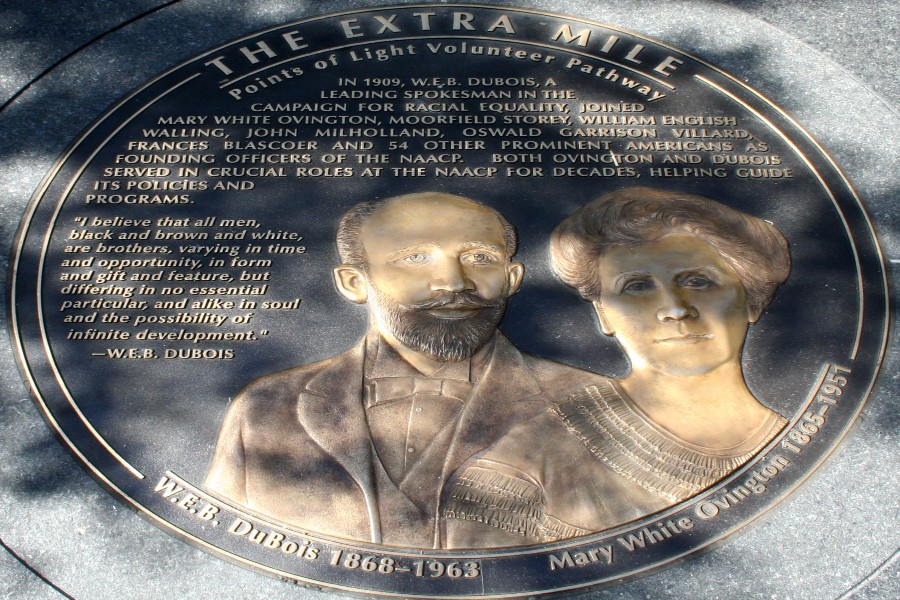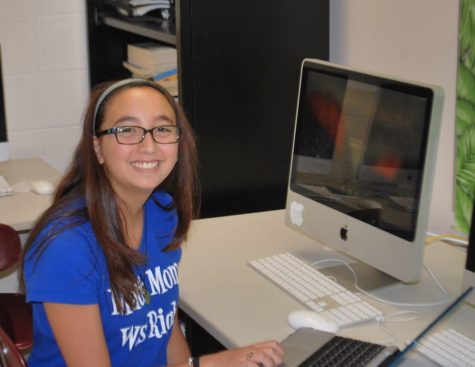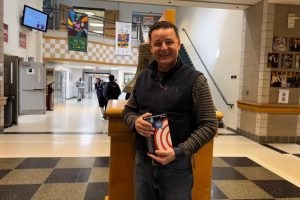Woman of the Month: Abolition to Desegregation — The Life of Mary White Ovington
https://www.flickr.com/photos/65193799@N00
In Washington D.C., there is a national monument, called the Points of Light Volunteer Pathway, that honors men and women who have significantly improved America. Mary Ovington is one of the 34 people honored.
April 1, 2020
Mary White Ovington, a privileged, white woman, committed her life to improving the lives of African Americans. Her dedication led to the establishment of the National Association for the Advancement of Colored People (NAACP), an organization committed to erasing prejudice in public services, countering racial terrorism, and abolishing involuntary servitude of black Americans.
Born at the end of the Civil War, when slavery was still legal, Ovington was raised by parents who were active in the New York abolitionist community (“Mary White Ovington” [World Biography]). Her Unitarian minister, Reverend John Chadwick, encouraged her to promote social reform and civil liberties. Chadwick educated Ovington on social reform, women’s rights, and the concept of optimistic evolutionism, (the idea that “institutions” as a result of fate are in principle efficient, while those that are intentional are inefficient) (“Mary White Ovington” [Gale Literature]).
At Radcliffe College in Cambridge, MA, Ovington met William J. Ashley, an economic historian. Ashley instilled in her a belief that more radical social reform was necessary to resolve the social and racial problems resulting from social class issues. Intent on being a part of the solution to the problems, Ovington became a social worker.
In 1904, she joined the Greenwich House Committee on Social Investigations where she began researching the lives of African Americans in New York. Working as a social worker and communicating with African American intellectual W.E.B. Du Bois, Ovington gathered detailed information. In 1911, her research was published as Half a Man: The Status of the Negro in New York.
Ovington’s connection to Du Bois enabled her to meet William Monroe Trotter, John Hope, and Harry Clay Smith, men who, along with Du Bois, founded the Niagara Movement in 1905. From the men’s meeting at Niagara, a call for the extension of full civil rights to and the end of discrimination against African Americans emerged.
In 1908, race riots broke out in Springfield, IL. The violence that ensued proved the race dilemma was causing nationwide chaos. In response to the riots, Independent writer William English Walling composed an article counseling supposed reformers to “look to their consciences” (“National Association for the Advancement of Colored People”). Walling’s article, “Race War in the North” depicted the horrors African Americans faced. In the article, Walling questioned whether people could invoke change to aid them in their plight or if the racist voices of “southern segregationists” would grow to be normal throughout the nation.
“‘Yet who realizes the seriousness of the situation, and what large and powerful body of citizens is ready to come to their aid?’” – Walling (“NAACP”)
Ovington responded to Walling’s call to action: In January 1909, the two met with New York Mayor John Mitchell and social worker Henry Moskowitz to examine problems relating to the abuse of African Americans. They planned to hold a public forum to establish “the body of citizens” Walling mentioned in his piece (“NAACP”).
The group found a sympathetic ear in the form of Oswald Garrison Villard. In addition to being the grandson of prominent abolitionist William Lloyd Garrison, Villard also happened to be President of the New York Evening Post Company. “Through his own newspaper, the New York Evening Post, Villard publicized a call for a national meeting to consider the racism involved in repressing blacks” (“NAACP”). This became known as “The Call.”
“The Call” led to a forum being held in May 1909 and resulted in the formation of the NAACP soon thereafter.
Despite her continued work for pacifism and feminist reform, Ovington dedicated the majority of the remainder of her life to the NAACP. She influenced many aspects of the organization serving as treasurer, board member, vice president, acting chair of the board, and chair. Her most influential initiative was her campaign for the NAACP to dedicate its lobbying efforts toward equal government funding for black school systems, or desegregation entirely. Ovington’s proposed desegregation of the nation’s school systems would allow the future of America to learn tolerance, paving the way for a desegregated world. Ovington’s drive for equality proved successful when the “separate but equal” policy was unanimously abolished by the Supreme Court in the 1954 case Brown v. Board of Education (“Mary White Ovington” [Gale Literature]). Though she died three years prior, this achievement was the culmination of her life’s work.
Today, the NAACP, the organization Ovington co-founded, continues the work she began, pursuing equal treatment for all, the elimination of biases and the support of those impacted by prejudice.
Ovington was born on the eve of the abolitionist movement and died on the eve of the end of segregation. She fought for a world where all people, regardless of physical or social differences, could be afforded the same opportunities. Nearly three-quarters of a century later, I am able to attend school as a multiracial, multi-religious child without fear of persecution. Never once did I even consider that education would be withheld from me. In my life, I define who I am. In the past, people were labeled and, based on those labels, they were treated differently. The labels were glued to every child at birth, following them around forever. Based on their clothes, their skin, their speech, their religion, they were shoved into a box and trapped inside it for life.
Today, we still have labels. I, personally, could be labeled a heterosexual, a Catholic, a Jew, an Asian, a caucasian, a female. We have more control over how these labels are applied to us than did the children of Ovington’s time, but people still label us. The box is less pronounced and we may occasionally escape, but we are still subject to bias and prejudice.
We have yet to achieve Ovington’s ideal of social equality, but we continue to strive.









James • Jul 15, 2020 at 9:09 pm
From the little i have read about her,it seems like NAACP was her life.NAACP should name an award on her name.